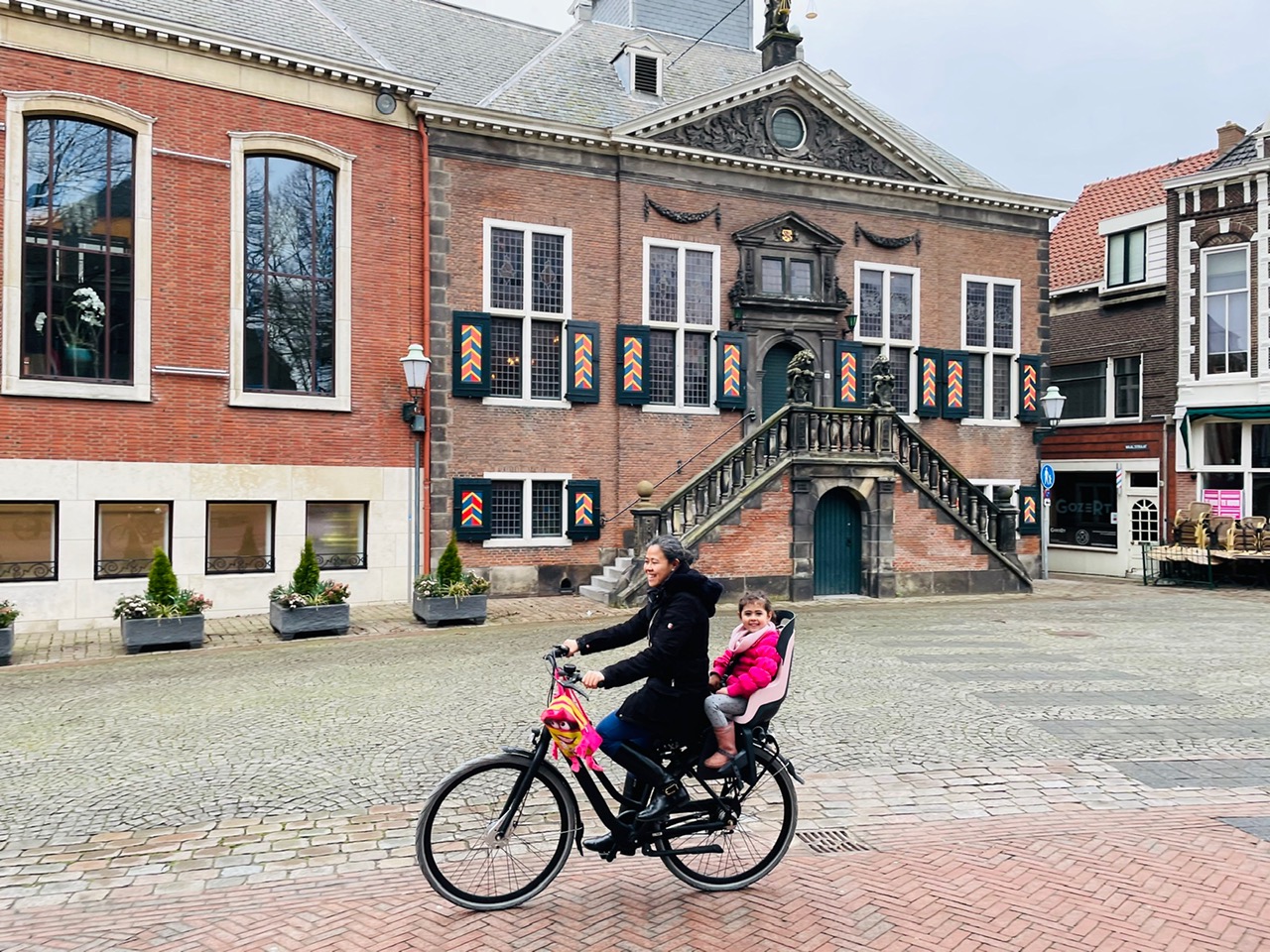My mother was visiting. I was going back to work and to help me transition, I asked her to come to the Netherlands. When I showed her the baby room, with a mattress on the floor where my daughter sleeps, she was shocked.
How could I let her 5-month-old granddaughter sleep alone?! This was my mother’s introduction to parenting in the Netherlands, the best country to raise children in 2020 according to UNICEF.
Although co-sleeping is gaining popularity, the common practices in the Netherlands is to let babies sleep alone, let them cry themselves to sleep and refrain from cradling them until they fall asleep. “We don’t want to spoil the children,” is the usual sentiment.
Dutch-style parenting was particularly challenging during the first 6 months when my head was still shrouded in a cloud of sleepiness. Contrary to how I easily adapted to the Dutch liberal ways, parenting confronted my Asian sensibilities and directly collided with my Filipino upbringing. But as the cloud of sleep deprivation lifted, I started applying the wisdom of both cultures in raising my child.
Pregnancy
Perhaps the most enjoyable part of parenting in the Netherlands is pregnancy. The country’s generous welfare system allows women to enjoy their pregnancy without worrying about the costs of regular check-ups or tests.
Unless they are above 40 years old or have certain conditions, expecting mothers are cared for by midwifery clinics. Gynecologists are only called in when there are complications. Health insurance companies shoulder basic pregnancy-related costs, from consultations, tests, and hospital bills.
A common pregnancy tradition in the Netherlands is gifting would-be mothers with a kraammaand, or baby boxes containing items that are useful during the first weeks of motherhood. These are given for free by health insurance companies, drugstores, or by colleagues, friends, and families as welcome gifts. They are so popular that I still have a stash of unused menstrual pads, hair clips, baby bonnets and mittens, and lotions until now.
Giving birth
The Netherlands is one of the few countries that still encourages natural home birth. Delivery through cesarean method is not a straightforward choice, and often discouraged if there is no medical reason. Gynecologists are not keen on administering epidurals unless there is a danger to mother and child.
The Dutch believe that pregnancy and childbirth must be kept as natural as possible, and with minimum medical intervention. Hospital stays are also discouraged. Unless there are complications, new mothers are sent home the moment they could pee and walk, which is anywhere from two to 24 hours.
While it sounds unnerving, giving birth in the Netherlands has taught me to trust my own body. Because the anesthesiologist was busy, I was surviving only on PCA pumps instead of epidurals during 5 hours of labor.
Post-natal care
Another unique part of motherhood in the Netherlands is the post-partum period or kraamtijd. In addition to regular check-ups by a midwife, new mothers are assigned a kraamverzorgster. These maternity assistants are not midwives but are specialized in caring for new mothers for seven days after giving birth. In addition to nursing duties like cleaning wounds or assisting mothers to the shower, they also help with small household chores like cleaning, cooking, or taking care of other small children.
It was uncomfortable having a stranger in my house, particularly at a time when I was most vulnerable. But having someone assisting during the first week of recovery was a big help, especially when it was free.

Working mom
Surprisingly, the Netherlands is still very traditional when it comes to raising children. It is normal and expected for Dutch fathers to work full-time and continue climbing career ladders while Dutch mothers settle for part-time jobs to be able to juggle working life, household duties, motherhood, and personal time. According to the 2018 report of the Central Bureau of Statistics, among working parents with children under 12 years old, 57% are couples where men work full-time (more than 38hrs/week) and women are working part-time (21hrs/week.)
When I gave birth in 2017, fathers in the Netherlands were only given 2 days paternity leave as opposed to 16 weeks of maternity leave. It was one of the few backward laws in an otherwise liberal country, which had me raising this issue with everyone and anyone who would listen. Since 2019, the law has allowed fathers working full time 5 days of paternity leave and a total of 6 weeks of paid parental leave.
Being a working mom is perhaps the hardest part of my parenthood journey. Unlike in the Philippines, yayas or nannies are hard to find and awfully expensive in the Netherlands. At the same time, help from family is not commonplace, particularly in our case where my parents in-law live 150 kilometers away. So, like most Filipina moms, I called on my mother for help.

Day care
Children in the Netherlands can go to daycare as early as 3-months old or when their mothers are expected back at work. Although partly government subsidized, the cost of day care in the Netherlands is still more expensive compared to other European countries like Germany, Belgium or Scandinavian countries. This is one of the reasons why Dutch women choose part-time work instead of spending their salaries paying for daycare.
I do not believe that I would be a better mother if I stopped working so I continued working full time. My husband and I divided our unpaid parental leave equally so we could both work 4 times a week and dedicate one day to our daughter.
We enrolled our daughter to a daycare when she turned one. This is where my Asian sensibilities were particularly challenged and I realized that having a career as a mother depends entirely on my willingness to trust other people.
I wasn’t yet ready to give up control – of who will be taking care of my daughter while I work, what she’ll be eating, who’ll be picking her up (or not) when she’s crying, or who will be cleaning her. I had to step out of my comfort zone before I was able to leave my child in the care of total strangers, in an environment completely different from where I grew up.
In the Philippines, the saying “it takes a village to raise a child” is true in literal sense. Families, from grandparents, sisters to aunts and cousins, even the neighbors are expected to participate in child rearing. In the Netherlands, this village is a group of professionally trained individuals who subscribe to a rigid method of “rust, reinheid en regelmaat“, loosely translated to rest, neatness and order. In Dutch day care, children follow strict schedules on eating, sleeping, and hygiene. In the spirit of Dutch equality, they are also given the same food and use the same brand of diapers.
I must have turned heads when I brought home-made pancakes and my kid’s own brand of diaper to the nursery. I probably annoyed the teachers whenever I would turn up unannounced at lunch time. I went on for months complaining about daycare but in the truest Dutch sense, my husband would only shrug his shoulders and tell me to get used to it.
My trust eventually grew, and I began to appreciate the dedication and professionalism of the staff at the nursery. In the same way, I realized how disadvantaged Filipino nannies are back home. In their kind of job that requires love more than effort, they’re given back less than what they deserve – proper salaries, benefits, training and skills development.

Family bond
I grew up on a small island, surrounded by a big family. In my ideal world, I’ll be a career woman who leaves her daughter to her nanny and grandparents during the day, where her baby spends weekends and summers with her cousins, pampered by her uncles and aunts and surrounded by her big family.
But the reality is she will be growing up in a very individualistic society where the family bond is different from what I was used to. She won’t be seeing her cousins and nephews as often as we want, either because of distance or different priorities.
She would have to make friends, as they would not come automatically like me and my cousins. Not being the kind of mother who arranges play-dates, I am afraid I also have to step out of my expat bubble once my child enters primary school and starts making friends.
Essentially, that is what children do. They rip you out of your comfort zone so you can be a better person. I learned more about myself in the last four years than my entire lifetime. I experienced the extreme sides of emotions; I’ve learned to love unconditionally, and I am thankful more than ever that I’m privileged to raise my child in an affluent and liberal nation. The trade-off is that I have to work a little harder instilling Filipino values in my daughter, so that she will recognize her Filipino roots and identity in the future.
Do you want to share your motherhood experience as an expat? Email us your story, editor@thefilipinoexpat.com
What's Your Reaction?
Dheza Aguilar is the Managing Editor of The Filipino Expat Magazine. She was a former Netherlands correspondent for ABS-CBN, and freelance writer for other publications. She works for a supply company in Rotterdam and is eternally juggling passion and career.




